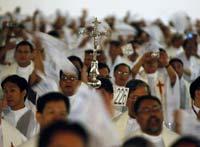Bishops oppose abortion bill

Catholic Bishops in the Philippines oppose potential legislation which would allow safe abortions
Reproductive health and women’s rights advocates have urged the government of the Philippines to pass a law allowing “safe and legal abortion,” citing a new report which states that underground procedures kills about 1,000 women in the Catholic country each year.
The report “Forsaken Lives: The Harmful Impact of the Philippine Criminal Abortion Ban” released by the New-York-based Center for Reproductive Rights (CRR) estimates that more than half a million Filipino women induce abortions every year. Of these, around 90,000 seek treatment for complications.
“Our Congress should address this issue by passing a law that expressly allows safe and legal abortion,” said Attorney Clara Rita Padilla, Executive Director of EnGendeRights.
Women’s advocates asked the Philippine Congress this week to legalize abortion under certain conditions, such as when the life or physical and mental health of a woman is at stake, when the pregnancy is a result of sexual assault, or when the fetus is impaired.
However, the Catholic Bishops Conference of the Philippines or CBCP rejected the proposal.
Responding to the figures describing the incidence of unsafe abortion cited by the study, CBCP legal counsel Josephine Imbong said, “Kung maraming drug addicts, gawin na lang nating legal ang drug addiction? (If there are many drug addicts, does that mean we should make drug use legal?”
Imbong, The 62-year-old mother of eight, expressed skepticism about the report’s findings regarding the widespread incidence of unsafe abortion.
However, GMA-7’s citizen journalism platform, YouScoop, said it often receives photographs of aborted fetuses found abandoned.
The Revised Penal Code of 1930 orders imprisonment for any woman found guilty of inducing abortion upon herself, or for any physician or midwife that will assist her. This is supported by the 1987 Constitution which states that the State shall “equally protect the life of the mother and the life of the unborn from conception.”
According to the CRR report, however, “Criminalization of abortion has not prevented abortion in the Philippines, but it has made it extremely unsafe, leading directly to the preventable deaths of thousands of women each year.”
The report found that the most typical methods of unsafe abortion practiced in the Philippines were abdominal massages by traditional midwives or manghihilot, the unsupervised consumption of contraction-inducing drugs or traditional herb concoctions, and the insertion of catheters into the uterus.
These methods resulted in physical complications such as hemorrhage, sepsis, damage to the uterus and other internal organs, and death, the report said.
Dr. Florence Tadiar of the Institute for Social Studies Action or ISSA, a human rights advocacy group that is also supporting the liberalization of the law on abortion, said campaigners are starting to hold dialogues on the issue.
“What we’re trying to do is initiate a discussion about the human rights violations by the government-- violations of the international commitment of the Philippines to women’s health,” she said.
“One recommendation of the report is that the CBCP will respect other religions. The Catholic church is not the religion of the state,” Tadiar added. “Even the prevention of abortion, the prevention of pregnancy, they are already making it a morality issue. They are deeming it a sin.”
The World Health Organization says worldwide, the impact of unsafe abortion was “a major health concern” that claims the lives of 67,000 women yearly. It has urged countries to deal with the preventable problem that stems from reasons including unmet family planning needs and restricted access to safe abortion services.
“Access to safe, legal abortion is a fundamental right of women,” a WHO journal added.
“The Philippine government has created a dire human rights crisis in the country,” said Nancy Northup, president of the Center for Reproductive Rights
She said it was “time to break the silence around abortion in the Philippines and for the human rights community to put pressure on the government to decriminalize abortion and immediately improve the medical care that women receive.”
Padilla, Executive Director of EnGendeRights said : “Making abortion safe and legal will save the lives of about 1000 Filipino women representing the number of women who die every year from unsafe abortion.”
“The legalization of abortion does not increase the number of women inducing abortion instead it has led to a decrease in number of women dying from unsafe abortion. Where abortion is legal, like in Canada and Turkey, abortion rates did not increase while the Netherlands, with its liberal abortion law and widely accessible contraceptives and free abortion services, has one of the lowest abortion rates in the world. Deaths due to abortion fell 85 percent after legalization in the US.”






